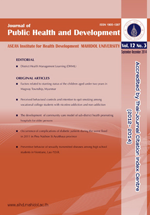Development of a caring model for patients with uncontrollable type 2 diabetes mellitus by using the chronic care model for Bueng Sanan Health Promoting Hospital
Main Article Content
Abstract
The aim of this study was to analyze and development caring model system for people with uncontrollable type 2 diabetes mellitus by using chronic care model of Bueng Sanan health promoting hospital in Pathumthani province.
A mix methods design was used. The development of caring system model for people with uncontrollable type 2 diabetes mellitus by using chronic care model and participating strategy of the people with uncontrollableType 2 diabetes mellitus, care giver, health care providers, and community health care providers were used to analyze and development caring for participants. The main targets participants are uncontrollable type 2 diabetic mellitus people and the secondary target participants are care givers, health care providers, and community health care providers. The research tools are the type 2 diabetic mellitus people and caregivers’ questionnaires, and in-depth interview of health care providers in communities about health care service system issues. Descriptive statistic were used to summarize demographic data. Using qualitative content were analyzed. Result: 1) organization policy setting need to define indicators for people with uncontrollable Type 2 diabetes mellitus. 2) Separate data recording or mark for people with uncontrollable Type 2 diabetes mellitus a by creating patients’ data for planning care by use ping pong checking live 7 color: A.) Collection case B.) Set priority C.) Multidisciplinary team approach exchange knowledge and discuss a case studies D.) 1. Creating the guidelines and standards of care. Concerning patients with complications, have procedure to follow up by appointment two times / month. 2. Plan to create an innovative design by nurse, family, or community volunteers. To maintenance and sharing the plan aims to reduce blood sugar levels. E.) establishment of self-help groups by discussion and knowledge sharing. F.) Referral system for treatment. G.) Follow up case although make project and planning by health care provider collaboration with community stakeholders to allow continuing care.


